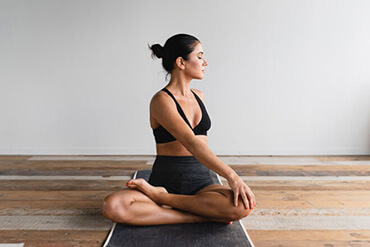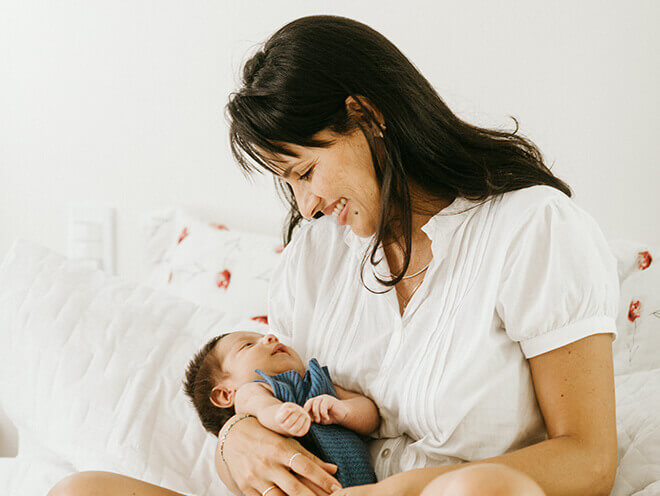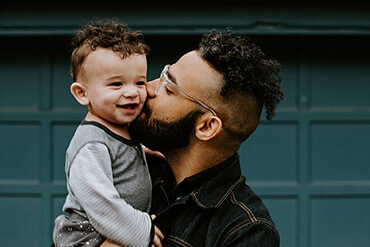Home - Hydration
If water is essential to life, then proper hydration is essential for living well.
Because our bodies are made up of around 60% water, a hydrated body is a healthier body*. And though drink options may be plentiful, it just so happens that nature provides us with the best hydration option – plain water – in pure abundance. The water isn’t only the healthier drinking option, but it’s the best form of hydration because it replenishes without extra, unnecessary additions like sugar.
Everyone–and we do mean everyone–needs water throughout every stage of life, but the right amount to keep you well hydrated can vary. Take a look at the recommendations for the amount of water you should be drinking daily based on age, gender, or throughout the process of motherhood.
*European Food Safety Authority (EFSA) experts have validated that water contributes to the maintenance of normal physical and cognitive functions (at least 2,0 L of water, from all sources, should be consumed per day)
| TARGET DEMOGRAPHIC | ADULTS |
|||||||
|---|---|---|---|---|---|---|---|---|
FOR DAILY TOTAL WATER INTAKE |
1,1-1,2L | 1,3L | 1,6L | Girls 1,9L Boys 2,1L |
Women 2,0L Men 2,4L |
2,3L | 2,7L | Women 2,1L Men 2,5L |
| WATER FROM BEVERAGES (ESTIMAED 80% TWI) |
0,9L | 1,0L | 1,3L | Girls 1,5L Boys 1,7L |
Women 1,6L Men 2,0L |
1,8L | 2,2L | Women 1,6L Men 2,0L |
| NO. OF GLASSES (1 GLASS = 250ML) |
|
|
|
|
|
|
|
|
Every single thing we do–from opening our eyes in the morning to running a marathon–requires our bodies to work, and because water is one of the most important things our bodies need to fuel that work, we lose about 2,8L of water throughout the course of an ordinary day. And while 2% may not sound like a lot, this water must be replaced for us to feel and perform our best.
Nearly half–49% of all adults–don’t drink enough water to replace what’s naturally lost, and could benefit greatly from more water intake on a daily basis. Not hydrating enough can lead to dehydration and even slight dehydration can cause unpleasant side effects like:
• Poor physical performance
• Poor brain or memory function
• Headaches, tiredness, or low mood
The only way to prevent dehydration is through–you guessed it–hydration, like drinking water.
The recommandations outlined in this section are based on a 2019 global scientific literature review.

A healthy lifestyle doesn’t begin and end with the body alone, it’s equally important that we care for our minds and mental health. Just like our bodies, our brain performs its best when well hydrated. Even minor dehydration (missing less than 2% of your body’s water) can affect our moods and brain function. Drinking at least 2 liters of water per day can not only help us feel our best, but improve concentration and alertness, and prevent tiredness or headaches.
Everybody is unique, but all bodies–young or old, big or small–need to stay active for optimal health. And in order for our bodies to perform our best during these activities, we must regulate our body temperatures, which is easier when we’re properly hydrated. Our muscles alone are made of 76% water, so it’s important to hydrate well before, during, and after physical activity.
Why does our body lose water when we move?
During exercise, our heart beats faster and our body temperature increases, which then causes us to sweat, and this sweat is made from our body’s water. The best way to stay hydrated during exercise is to replace the water you’re losing. Drinking water helps us keep our body temperature normal. When your body reaches 39.5℃, you may start feeling fatigue because your brain is trying to protect your body by slowing you down. You can combat heat and its effects on your performance by drinking plenty of water.

HYDRATION TIP
If you’re not already hydrated prior to exercise, you should slowly start hydrating several hours before the exercise in order to allow the fluids to absorb.

Bodies of all ages are largely made up of water, but children have an even higher percentage of body water than adults. This means it’s even more vital for children to be well hydrated so they can feel, think, and perform at their best.
While there are many drink options, pure water is especially good for children ages 5-11 because it hydrates without sugars. And water is especially important to help keep an active child’s body cool during exercise.
Only 31% of children and teens drink their daily recommended amount of water and only 14% of their fluid intake occurs during schooling hours, so many children are entering and leaving school dehydrated. Encouraging your child to hydrate well means they’ll be more alert, have a better attention span, and a better short-term memory. Good hydration fuels a child’s ability to focus and learn.
Setting a good example can go a long way; children of parents who drink water are 38% more likely to also drink water regularly. The family that hydrates together, lives healthier together.
Hydration for babies
As a new parent, you only want the best for your baby, especially when it comes to their health and hydration. Choosing pure, still water is a simple way to make sure you’re both hydrating the way nature intended.
HYDRATION TIP
When choosing a water for baby’s hydration, pay close attention, because water isn’t always “one size fits all.” Because a baby’s kidneys aren’t fully mature, they need a water that is softer and lower in mineral content, like evian. evian recommends to follow the breastfeeding guidelines from WHO for the first 6 months of life.
Pregnancy
During pregnancy, you’re not just eating for two, you’re also hydrating for two. It’s recommended that pregnant women drink water every day during their pregnancy. Because your baby is hydrated by what you drink, so it’s important to make healthier drinking choices like plain, quality water.
Breastfeeding
If you’re a breastfeeding mother, you’re naturally providing the best nourishment for your baby. And to keep things natural, hydrating the way nature intended–with plain, still water–means sweeteners or additives from other drinks aren’t making their way into your breastmilk. It’s also important to know that in addition to regular water intake, it’s recommended that breastfeeding women drink 3-4 more glasses of water per day than they normally would.
HYDRATION TIP
In addition to regular intake, it’s recommended that breastfeeding women drink 3-4 more glasses of water per day than they normally would.
Bodies of all ages are largely made up of water, but children have an even higher percentage of body water than adults. This means it’s even more vital for children to be well hydrated so they can feel, think, and perform their best.
While there are many drink options, pure water is especially good for children ages 5-11 because it hydrates without sugars. And water is especially important to help keep an active child’s body cool during exercise.
Only 31% of children and teens drink their daily recommended amount of water and only 14% of their fluid intake occurs during schooling hours, so many children are entering and leaving school dehydrated. Encouraging your child to hydrate well means they’ll be more alert, have a better attention span, and a better short-term memory. Good hydration fuels a child’s ability to focus and learn.

HYDRATION TIP
Set a good example. Children of parents who drink water are 38% more likely to also drink water regularly. The family that hydrates together, lives healthier together.
Our focus is to raise public awareness of healthy hydration, and encourage sustainable healthy hydration habits, by sharing scientific research, educational materials and practical tools.
Stay hydrated, stay in touch. Connect with us.

2022 Société Anonyme des Eaux Minérales d'Evian. All rights reserved.